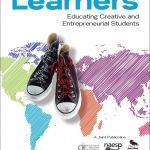Articles tagged with: standardized testing
Blogs, China/Chinese, Education Reforms, Featured, Globalization »

More about the book
I am very pleased to announce that Corwin Press will release my new book World Class Learners: Educating Creative and Entrepreneurial Students in association with the National Association of Elementary School Principal (NAESP) next month, June 2012. The book is about preparing global, creative, and entrepreneurial talents. It is my attempt to answer a number of pressing questions facing education today. These questions are exemplified by two new stories that have dominated the media recently, one around the Facebook IPO and the other the debt and jobs …
Blogs, China/Chinese, Education Reforms »
China’s Peking University (or Beida) has been under fire for trying to answer the nation’s call for more innovative and creative talents. In an attempt to attract more “unusual or extraordinary students” who may not do well on standardized testing, in this case, China’s infamous Gaokao (College Entrance Exam), Beida, one of the two most sought-after universities, decided to admit a very small number of (less than 3%) students based on recommendations of high school principals. Although these recommended students would still take the College Entrance Exam and go through …
Blogs, China/Chinese, Education Reforms »
China has been working on another round of major education reforms. A national team of government leaders, education officials, and education leaders have been working on a mid and long term strategic plan that will guide education development in China for the next decade or so for over year now. The team is led by China’s Premier Wen Jiabao. The team issued a national call for comments and suggestions in the summer and has received tens of thousands of them online and through traditional means.
I was in China last week. …
Blogs, Education Reforms »
The Fall issue of AASA Journal of Scholarship and Practice includes a commentary of mine on the common core standards. This article gives me more space to lay out my views and bring evidence to support them than the Op-ed piece published in Detroit Free Press. The issue also includes a thoughtful editorial on standards. You can read the entire issue here and my article starts from page 46.
Share
Blogs, Education Reforms »
Yesterday(September 24, 2009) Secretary of Education Arne Duncan delivered his first major speech about the reauthorization of the Elementary and Secondary Education Act (ESEA) 1965. The law’s last reauthorization took place in 2002 and resulted in what is known today as No Child Left Behind (NCLB). In his speech, Duncan acknowledged that NCLB has significant flaws and promised to work with Congress to correct the problems. But based on this and his previous speeches as well as the actions of the US Department of Education under his leadership, I must …
Blogs, Education Reforms »
With the release of the official public draft of the college- and career-readiness standards in English-language arts and mathematics by the NGA and CCSSO’s yesterday (September 21, 2009), the U.S. is moving closer to national standards. Incidentally I read a study published in a recent issue of the American Educational Research Journal (AERJ) that expels the other myth that has been used to support national common standards.
Proponents of national common standards have basically used two myths to support their efforts: the international achievement gap and the domestic achievement gap. I …
Blogs, China/Chinese, Education Reforms »
In a recent interview, I criticized the misperception that somehow Americans are less interested in the education than their Asian counterparts. American parents have been said to be not as devoted to their children’s education as Asian parents, so have been American teachers, and the American public. In the interview, I said, I believe barring some exceptions, all parents, Asian and American and African and European, are all interested in their children’s education because all we are genetically programmed to want the best for all off-springs. After all, they are …

















